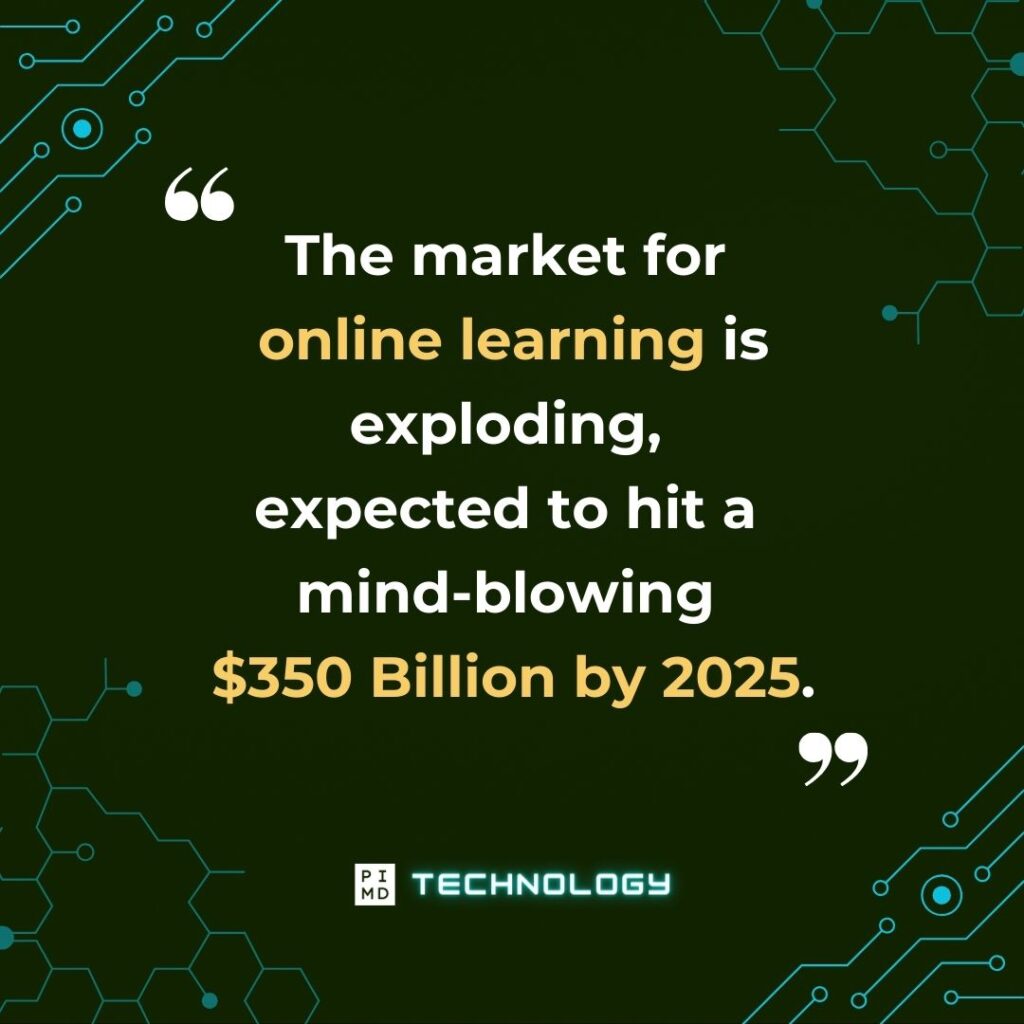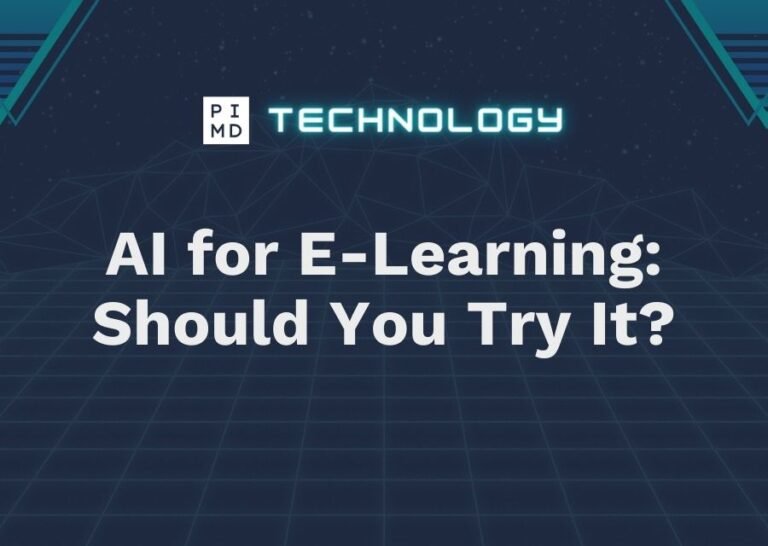Tired of staring at a screen full of text and feeling like nothing is sticking?
I know online classes can be difficult. But imagine a learning experience that’s like having a personal tutor in your pocket, constantly adapting to your strengths and weaknesses and keeping you engaged.
It’s already happening — Artificial Intelligence (AI) is transforming e-learning.
Let’s talk more about it and see for yourself if it’s worth considering. Ready? Let’s dive into the future of e-learning!
Table of Contents
Personalized learning with AI
The online learning market is exploding, and is expected to reach $350 billion by 2025. But guess what? Traditional online courses often miss the mark, leaving you bored and without a deep understanding of the subject.
Why; Because effective training goes beyond rote memorization. It’s about understanding concepts, applying knowledge and tailoring the learning journey to individual needs… with added ‘creativity’.
This is where personalized learning shines. Personalized learning leverages student data, such as strengths, weaknesses, learning pace, and preferred learning styles, to create a personalized learning experience.

Interested in AI tools for personal or professional use? SUBSCRIBE AND TUNE IN TO OUR PODCAST:
#169 The Doctor’s Tools of the Future: Harnessing the Power of Artificial Intelligence, by Dr. Peter Kim
See how artificial intelligence is making personalized learning a reality:
Adaptive learning platforms
Powered by AI algorithms, these platforms analyze student data and adjust the difficulty of learning material in real-time.
Imagine a platform that automatically recommends advanced lessons if you consistently ace quizzes, or provides additional practice exercises if a topic proves difficult.
These platforms go beyond simple difficulty adjustments. they also recommend relevant learning paths based on your progress and personalize content to match your individual learning style.
Leading examples like Knewton and Dreambox Learning used in K-12 education demonstrate the power of AI-powered adaptive learning. Check them out!
Evaluation and feedback with artificial intelligence
Traditional online courses often struggle with assessment. Evaluating presentations and providing in-depth feedback can be time-consuming for instructors, leaving students with limited guidance.
Artificial intelligence steps in to bridge this gap:
Automated grading and personalized feedback
AI can automate the grading of quizzes, multiple-choice questions, and even short-answer questions, freeing up valuable instructor time for more personalized interactions and discussions.
This does not stop at just assigning a rating. AI can provide immediate feedback with insights into strengths and weaknesses, personalized suggestions for improvement, and identify knowledge gaps that require further exploration.
Ethical issues:
While AI scoring offers significant benefits, it is vital to address ethical concerns. Bias in the training data can lead to unfair evaluations.
Educators should be involved in the selection and implementation of AI grading tools to ensure fairness and transparency.
AI-Driven Content Creation and Delivery
Creating engaging and effective e-learning content is a significant challenge. AI becomes a valuable partner in content development:
Attractive educational material and multilingual accessibility
AI can help create interactive elements like quizzes, games and simulations that keep students engaged. It can also personalize training materials based on individual needs and learning styles, adjusting the level of detail, graphics and examples to meet your specific preferences.
Additionally, AI can translate educational materials into multiple languages, making education more accessible to a global audience.
Continuous improvement
By analyzing data and user performance, AI can identify knowledge gaps and suggest areas where content needs improvement. This ensures that learning materials remain relevant, effective and meet the evolving needs of learners.
AI tools for improved content creation
Many AI tools can optimize the creation of eLearning content. Tools like Murf AI use AI to create realistic-sounding narration for eLearning modules, while EdApp leverages AI to turn existing content into engaging micro-learning experiences.
The future of artificial intelligence in e-learning
The future of artificial intelligence in e-learning is full of exciting possibilities:
AI conversationalists and immersive learning
Imagine having a virtual tutor available 24/7 to answer questions, provide personalized learning support and offer encouragement. AI chat tools are on the horizon, promising personalized learning journeys with AI-powered chatbots acting as virtual companions.
Additionally, the integration of Virtual Reality (VR) and Augmented Reality (AR) with artificial intelligence will create immersive learning experiences that put students in the center of the action. Imagine practicing a surgery in VR or exploring historical events through an AR experience, all with AI guidance and feedback.
Advanced Progress Monitoring
AI will analyze student data in real time, enabling personalized intervention and targeted support. Educators will be able to identify at-risk students early and provide additional resources, ensuring that everyone stays on track for success.

Invest with confidence in passive real
Real estate offers in just four weeks!
Everyone knows that real estate investing can be intimidating, but it doesn’t have to take years to learn. Passive Real Estate Academy (PREA) is your chance to join a community of like-minded investors who will show you how to leverage other people’s time, capital and experience to create your ideal life.
Our path to passive income for doctors meets you where you are. Whether you are completely new to your journey to financial freedom or already building your passive income streams, you will find value in our course that accelerates the process of becoming an expert.
Join a community of doctors who support each other on the journey of creating passive income!
A new modern way of learning
The rise of artificial intelligence in e-learning presents a transformative opportunity for both students and educators.
With AI helping with personalized learning paths, automated assessment with insightful feedback, and engaging content creation, students can experience a more effective and engaging learning journey. We have only scratched the surface of what AI can achieve in eLearning.
Explore the wide variety of AI-powered learning platforms available and discover how they can personalize your learning journey.
Are you ready to embrace the future of learning? Subscribe to our newsletter for more information on how AI is revolutionary!
IF YOU WANT MORE CONTENT LIKE THIS, MAKE SURE YOU ARE SUBSCRIBE TO OUR NEWSLETTER TO GET UPDATES ON THE LATEST TRENDS IN AI, TECH AND MORE.
Peter Kim, MD is its founder Passive Income MDits creator Passive Real Estate Academy, and offers weekly training via his Monday podcast, the Passive Income MD Podcast. Join our community at Passive Income Doc Facebook Group.
Frequent questions
No, AI is not intended to completely replace teachers. Instead, AI tools can become valuable assistants, freeing up teachers’ time for more personalized interactions and complex learning activities.
AI can automate tasks like grading quizzes and providing key feedback, allowing teachers to focus on deeper discussions, guide students through difficult concepts and provide emotional support.
Research shows that artificial intelligence learning can be highly effective.
An artificial intelligence program developed by a Stanford researcher provides 80% accurate recommendations to students in self-paced digital learning, comparable to the advice of human experts. AI can personalize the learning experience based on individual needs and learning styles, leading to better engagement and retention.
While artificial intelligence offers many advantages, it is important to recognize its limitations. AI algorithms are only as good as the data they are trained on. Biases in training data can lead to unfair ratings or content that excludes certain perspectives.
Additionally, AI can grapple with complex concepts or nuanced topics that require human understanding and creativity.
Many artificial intelligence tools are now available to improve e-learning experiences. Here are some examples:
Adaptive Learning Platforms:
These platforms use artificial intelligence algorithms to personalize learning paths and content difficulty based on individual student data. (eg Knewton, Dreambox Learning)
Automated Scoring Tools:
AI can automate the grading of quizzes, multiple-choice questions, and even short-answer answers, freeing up instructor time.
AI-powered content creation tools:
AI can help create engaging content such as simulations, quizzes and personalized learning materials. (eg Murf AI, EdApp)
With the growing number of AI-powered learning platforms available, it’s easier than ever to explore this option.
Many platforms offer free trials or introductory courses that allow you to experience AI-based learning firsthand. Consider your learning style, goals, and budget when deciding if AI learning is right for you.
If you are still not sure, subscribe to our newsletter to get the latest updates on AI and more. Something may come up and be interesting!

